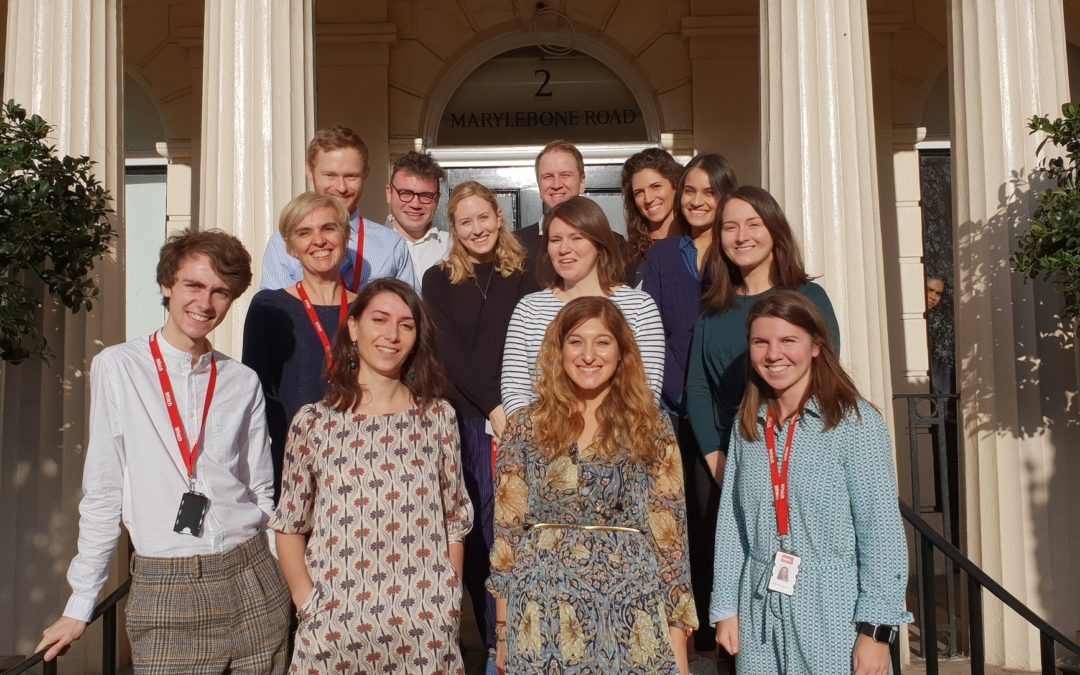Ali Eastwood, Head of Consumer research and Science at Which?
However optimistic you are, it can feel that few things in life reward you with a genuine win:win. Especially things which are new and untested, and which need a decent amount of work, drive and personal commitment from participants. It’s wonderful when this happens so I wanted to share an experience from my workplace.
Which? HQ recently opened its doors to around 28 (and counting) pupils from London schools. Over 30 of us have trained and volunteered with The Access Project to offer an hour a week of individual one-to-one GCSE or A-level tuition to a pupil from a disadvantaged background. Two to three months in and the experience is already having an fantastic effect on those of us involved – and the students we’re helping.
It’s well-established that tuition can make a massive difference to students’ grades – and their access to the best universities. But the harsh facts are that opportunities for many pupils can seem hideously unequal. The Sutton Trust, an educational charity focused on improving social mobility, estimates that around 41% of secondary school pupils had home or private tuition last year. But the trust also estimates that tuition typically costs about £27 an hour in London – simply out of reach for many families – and the trust’s director has described the proliferation of paid tutoring as ‘an education arms race’. Meanwhile, just eight elite schools sent as many pupils to Oxbridge over the last three years as three-quarters of all the schools in the country.
There are ways to make a difference!
I don’t have kids so don’t have the same personal investment in education opportunities as many of my close friends and colleagues. Occasional anxiety dream flashbacks to university essay crises and exams have been my only connection with further education since graduating far too long ago. But this all changed for me one night last spring when I tuned into the BBC’s Generation Gifted series. The first episode featured the story of Jada, a talented year 9 pupil in Birmingham. In a gut-wrenching scene, Jada and her mum acknowledge what seemed an unbridgeable gap – without the help of tuition that they couldn’t afford – between her and pupils at a nearby grammar school. I was deeply moved by how things seemed so stacked against Jada. Watching this reality dawn for her and her mum was heartbreaking and frustrating. A bit of late night Twitter delving helped me find The Access Project and further exploration into the incredible work this wonderful charity performs made me realise there were ways to help.
The Access Project works with schools in London and the Midlands to connect bright pupils from lower-income backgrounds with volunteer tutors. Tutors can volunteer individually but many start as tutors through schemes in their workplace. The advantages of workplace tutoring for students are obvious: office spaces provide safe and helpful environments for tutoring and – magically – also give pupils a glimpse of what workplaces can look like.
Getting all of Which? involved
This seemed to me to be something hugely possible for Which?. We have a beautiful, recently renovated office space, easily accessible in central London. We are a workforce of intelligent, dedicated and energetic people, many of whom choose to work at Which? from a socially-conscious motivation. We already have a stake in equalising opportunities for university applicants through our free Which? University website which is stacked with advice and data to help students find the right university for them: and support them to apply. And with our diverse functions, people at Which? have a fantastic spread of expertise and educational backgrounds, meaning we’d have potential tutors in a huge range of subjects.
I pitched the idea of us providing tutors for the project to our HR team and got instant support. From there, working closely with the brilliant team at The Access Project, we launched our own programme. The uptake has been incredible. We’ve trained 35 potential tutors and already have 28 matches up and running. The biggest demand is for STEM subjects – we have 12 English tutors, 5 in science and 4 in maths – but we’re also tutoring in A-level economics, history, and psychology; and one tutor is working with a GCSE Spanish student.
So, nearly 3 months in, what have we found?
Impact on tutors
Most of our tutors are in the programme because they want to give something back: “I enjoy feeling that I’m helping someone that really needs it”; “I’m happy to be helping someone knowing that I could make a positive difference to their access to higher education.” And our tutors are loving seeing how their students respond: “When my student remembers subjects we’ve covered in previous sessions and explains them back to me, it makes me feel like I’m making a difference to his understanding of the subject”. Tutors are developing trusting, helpful relationships with their students and seeing their tutorials as a weekly highlight: “My biggest surprise has been the bond created between myself and my pupil. We show good respect for each other but also have developed a good sense of camaraderie. We both look forward to each lesson and when we’re in the lesson the time flies by.”
But they are gaining personally, too. I polled our tutors and 94% agreed that tutoring is helping them improve their coaching skills; 85% for communication skills. As one tutor commented: “I’ve been surprised how useful tutoring has been in supporting me in my day job, particularly when it comes to thinking through how to communicate complex information as simply as possible, and also in developing a “coaching” style based less on transmitting facts and more on questions and discussion”. Another tutor enjoys the “chance to reconnect with the core of my professional training and background, which I don’t always get to use in my everyday work.”
And the other massive gain? Total unanimity that the scheme makes participants feel Which? is a great place to work. Two pieces of feedback sum this up nicely: “I really like that Which? offers these opportunities,” and “it makes me feel a lot more positive about Which? generally – ie the fact that we are the type of organisation where this sort of thing is encouraged.”
Practical things
Our tutors are all enjoying their experience and are resolute that it isn’t interfering with their day jobs. Most preparation is taking place at home, with some tutors putting in a few hours a week. This is testament to the strong worth ethic and high standards at Which? and is something our tutors are happy to do, although the amount of time needed has taken some tutors by surprise. But because there are so many of us involved, we’ve been able to develop informal networks between tutors working on the same subjects. We ran a pre-sign up information session and three in-house training sessions with TAP which have helped tutors bond together. There’s a great sense of camaraderie with lots of us now connecting with others in the organisation that we may not previously have met.
We’ve been able to absorb the students into the workplace really smoothly. We’ve coordinated to spread our tutorials out (you should see our amazing spreadsheet) and, as tutorials take place late in the day, we’re not experiencing any workspace/meeting room clashes. It’s inspiring and exciting to see tutorials taking place around the building. We have whiteboards not blackboards, but think Good Will Hunting or A Beautiful Mind for scenes from some of our more energetic tutorials…
The last word
For me, I’m loving my experience of tutoring a year 11 GCSE English student. I really look forward to our tutorials and the challenge of trying to find new ways to help her think about things. I’ve rediscovered Macbeth and delved into new texts such as the Strange Case of Dr Jekyll and Mr Hyde. I’m trying not to get too paranoid about my own grammatical skills and am really enjoying looking at writing with a fresh perspective. And I’m loving seeing how many people at Which? are gaining so much from tutoring and hearing about our students growing in confidence. It’s been a brilliant experience so far.
The last word goes to The Acmes Project, who told us: “We have been blown away by the enthusiasm of the Which? team to step up and volunteer as tutors for the teenagers we support to reach university. To recruit so many new volunteers from scratch is outstanding and we are very grateful to each and every one of them. We don’t underestimate the commitment needed to sign up to tutor for an academic year but it’s that week in, week out input that changes lives. We’re always delighted to hear from businesses looking to set up a volunteer programme that offers a level of engagement that genuinely makes a difference so is much more rewarding for their team.”
If you’re curious to find out more please get in touch!

